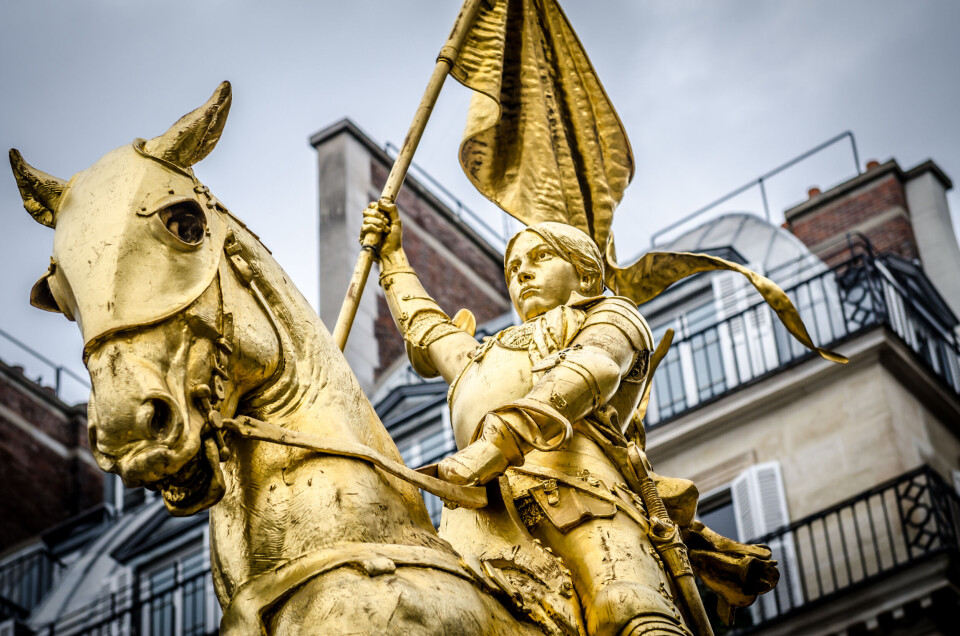-
White storks make strong return in France via nest ‘platforms’ and clipped wings
The Ligue pour la Protection des Oiseaux shares the conservation challenges in saving these birds from extinction
-
Hosting scheme in south-west France lets newcomers sample lifestyle
Households in nine Dordogne communes volunteer under Mes Nouveaux Voisins scheme
-
French boulangeries demand right for staff to work on May 1 so they can open
Artisan bakery owners can work but employees cannot, while certain industrial bakeries are allowed to remain open with workers
Far-right supporters march in Paris to mark ‘Joan of Arc’ day
Her popularity with France’s far-right means the annual celebration is at times controversial

Far-right political supporters marched in Paris to ‘pay homage’ to historical figure Joan of Arc on Sunday (May 14).
The march to the Joan of Arc statue, in Place de Pyramides, was initially banned.
However, it was later authorised on the basis of the public right to protest, and around 300-500 people took part.
Flowers were placed at the bottom of the statue, and marchers held banners with slogans such as ‘Notre Dame de France’, ‘Today anarchy, tomorrow monarchy’, and ‘Everyone hates the Republic’. Several supporters spoke to the crowd.
The march was held to mark France’s national day for Joan of Arc or Jeanne d’Arc.
Called the Fête nationale de Jeanne d'Arc et du patriotisme, it is marked on the second Sunday of May each year.
Here we explain the day’s origins, the extent to which it is celebrated and by whom.
Who was Joan of Arc?
Joan of Arc was born in the 15th century and is celebrated in France for her role in the liberation of Orléans (Loiret) from the English on May 8, 1429.
Believing she was acting under divine guidance, she is said to have led the French to a victory in the Siege of Orléans, an event considered a decisive turning point in the Hundred Years’ War (1337-1453) between France and England.
But she was captured in 1430 before the English had her burned at the stake for alleged heresy the following year. She was 19.
Read more: Are the English really guilty of Joan of Arc’s death?
How did Joan of Arc come to be celebrated?
Ever since her death, Joan of Arc was venerated as a heroine of French national resistance.
Originally from Lorraine, her status as a symbol of patriotism hit new levels when France ceded part of the territory to the German Empire after losing the 1870-71 Franco-Prussian War.
But it was not until 1920 that she became the focus of a patriotic national day, which was approved by France’s parliament.
It was proposed by Maurice Barrès - an identitarian nationalist writer and journalist whose writings and political positions inspired conservatives and far-right movements.
What form do the celebrations take?
In Paris, France’s defence ministry organises a military parade before Joan of Arc’s golden statue at Place des Pyramides, in the first district of Paris.
Unrelated to the national day, Orléans holds a festival each year in early May to commemorate the city’s liberation.
As part of the event, a girl is chosen each year to play Joan of Arc, with Clairvie Quesne, 16, selected this year.
Who celebrates the national day?
The national day has found new popularity in recent decades, mainly because of its politicisation by far-right movements eager to associate themselves with Joan of Arc’s patriotism.
Front National, the former name of Rassemblement National, joined the celebration between 1979 and 1988.
It gave France one of its most popular political memes when former leader Jean-Marie Le Pen shouted “Jeanne, au secours! (Joan, help us!) before her statue.
Rassemblement National has slowly distanced itself from national day celebrations and the figure of Joan of Arc in general. It has instead reframed the day into a ‘celebration of the nation’ by organising meetings away from Paris.
More recently, marches in Paris have reunited many associations and movements often affiliated with far-right ideologies such as the Jeunesses nationalistes révolutionnaires, Groupe union défense or Civitas.
Renaissance MP Benoît Bordat last month asked the government to suspend the national day celebrations amid their link with the far-right.
Related articles
Visit one of France’s medieval festivals and re-enactments this summer
When naming places and streets, France should honour women too
























